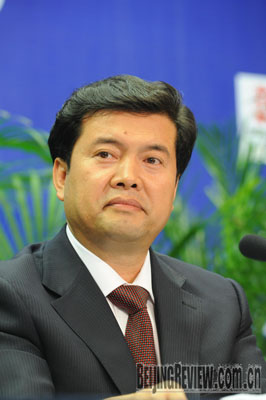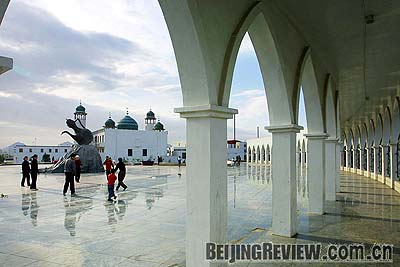|
|

|
|
Wang Zhengwei, Governor of the Ningxia Hui Autonomous Region |
October 25 will mark the 50th anniversary of the establishment of the Ningxia Hui Autonomous Region. Located in northwest China, Ningxia covers an area of 66,400 square km. It has a population of 6 million, of which 35 percent are Hui people.
Ningxia is said to be the best administrated autonomous minority region in China. To get a full picture of the region's economic and social development during the last five decades, Beijing Review interviewed Wang Zhengwei, Governor of the Ningxia Hui Autonomous Region.
Sound administration
Ningxia attributes its 50-year social stability and sound administration to the great unity of its people of different ethnic groups. Governor Wang, who is a Hui minority himself, summed up the region's administrative experience in three sentences: The minorities cannot live without the Han (the ethnic group that accounts for nearly 90 percent of the Chinese population); the Han cannot live without the minorities; and the minorities cannot live without minorities.

AN ARCHITECTURAL DELIGHT: Yinchuan, the capital city of Ningxia, is a place where Hui-style buildings harmoniously coexist with modern ones
"I think the autonomous system is the fundamental reason for the success in managing compact minority communities," Wang said, adding that the system is part of China's Constitution. The region's administration also is subject to the Law on Regional National Autonomy, which gives it a number of autonomous powers in economic development, resource exploration, and education and cultural development.
Wang cited education as an example. When applying to universities in Ningxia, students from minority families can receive 20 points more on their university entrance exams than their Han classmates. Students from Xihaigu, a remote mountainous area of Ningxia, can receive more favorable policies, because school conditions there are much poorer and the area does not attract good teachers, Wang said.
"Therefore, we cannot expect the education level from that area to be comparable to the urban areas," Wang said. "It is reasonable to offer them more favorable policies."
Unity and stability are two key words Wang uses to describe the region's economic prospects.
"The prerequisite for economic development is social stability," Wang said. Ningxia conducts annual region-wide checks on the implementation of the Law on Regional National Autonomy. The regional government punishes and fines those who violate the provisions of the law and rewards those who make great contributions to the people's unity, he said.
Improving people's livelihoods
Since its establishment, the Ningxia Government has always made people's livelihoods its priority in social development, especially because the underdeveloped region is confronted by many problems that affect the lives of individuals.
In areas where the Yellow River flows, for example, residents have no problem with access to drinking water. But the central and southern parts of Ningxia suffer from severe water shortages because of extremely low levels of rainfall.
"People have been living there for generations," Wang said. "They have no water, and droughts hot the area every year."
Wang said the Ningxia Government drafted a "migration policy" in an effort to improve people's living conditions. It encourages people in poverty-stricken areas to move to places where living conditions are relatively good and job opportunities abound. The government provides free homes and distributes cultivated lands to the poorest people who want to move out of the forest areas. For those who are relatively better off, the government provides them with subsidies of 3,000 yuan ($440), 5,000 yuan ($732), or 8,000 yuan ($1,171) to build homes. The government will relocate 200,000 others to places with potable water during the next five years, Wang said.
| 